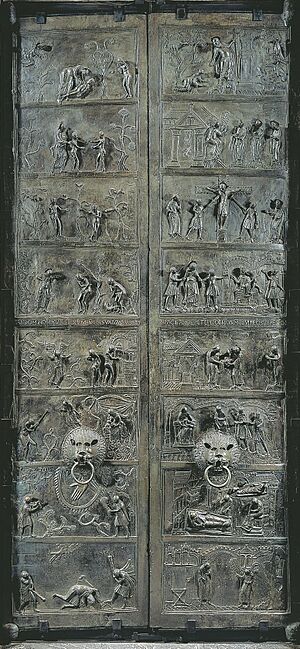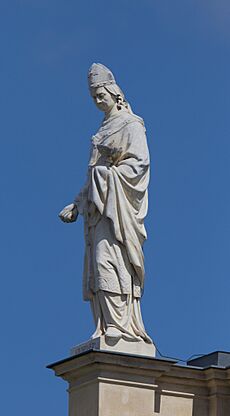Bernward of Hildesheim facts for kids
Quick facts for kids SaintBernward of Hildesheim |
|
|---|---|

Bernward's doors at St. Mary's Cathedral
|
|
| Born | 960 Duchy of Saxony |
| Died | 20 November 1022 |
| Venerated in | Roman Catholic Church Eastern Orthodox Church |
| Major shrine | St. Michael's Church, Hildesheim |
| Feast | 20 November |
| Attributes | Bishop vestments, small cross, hammer, chalice |
| Patronage | Architects, painters, sculptors, goldsmiths |

Bernward (born around 960 – died November 20, 1022) was an important religious leader. He served as the thirteenth Bishop of Hildesheim from 993 until his death.
Contents
Who Was Bernward?
Bernward came from a noble Saxon family. He lost his parents when he was young. His uncle, Volkmar, who was the Bishop of Utrecht, took care of him. Volkmar sent Bernward to study at the cathedral school in Heidelberg. There, a wise teacher named Thangmar taught him many things.
Bernward's Education and Skills
Bernward learned quickly. He became very good at math, painting, and architecture. He also learned how to make beautiful items from silver and gold. These included church vessels and ornaments. He finished his studies in Mainz. There, he became a priest. He chose to stay with his grandfather, Athelbero, to help him in his old age.
After his grandfather died in 987, Bernward became a chaplain at the imperial court. Soon after, Empress Theophano chose him. He became the tutor for her young son, Otto III, who was six years old.
Bernward as Bishop of Hildesheim
Bernward became the Bishop of Hildesheim in 993. This was during the time of the Saxon emperors. These emperors were from the area around Hildesheim. They were also related to Bernward. Hildesheim was a very important city then. Bernward wanted to make it look like a powerful center.
He planned to build a tall column. It would be like Trajan's Column in Rome. This plan never happened. But Bernward did put his name on roof tiles. These tiles were made under his guidance.
Protecting and Building Hildesheim
Bernward built a strong wall around the cathedral area. This wall had twelve towers. He also built forts in the countryside. These forts protected against attacks from nearby Slavic peoples. Many churches and other buildings were built under his leadership. He even built defenses to protect his city. These defenses were against attacks from the pagan Normans. He worked hard to protect his diocese from these attacks.
Bernward's Legacy
His life story was written down by his mentor, Thangmar. This book is called Vita Bernwardi. Bernward died on November 20, 1022. This was just a few weeks after a grand church was finished. This church was St. Michael's Church, which Bernward had built.
Bernward was declared a saint by Pope Celestine III. This happened on January 8, 1193. His feast day is November 20.
Today, some churches are named after him. These include St. Bernward's Church in Hildesheim. This church was built between 1905 and 1907. There is also St. Bernward's Chapel in Klein Düngen. This chapel dates back to the 13th century.
World Heritage Sites in Hildesheim
Bernward's work includes some very famous art. One example is a huge set of bronze doors. They are known as the Bernward doors. These doors are now at St. Mary's Cathedral. They show scenes from the Bible. These include the Fall of Man (Adam and Eve) and the Life of Christ.
Bernward also played a key role in building Michaelskirche. This church is an early example of Romanesque architecture. St. Michael's Church was finished after Bernward's death. He is buried in its western crypt. Both the Bernward doors and St. Michael's Church are now UNESCO World Heritage Sites.
Importance of Hildesheim's Churches
St. Michael's Church has greatly influenced architecture. It shows us what a past civilization was like. These two buildings and their art help us understand Romanesque churches. They are some of the best examples in the Christian West.
St. Michael's Church was built between 1010 and 1020. It has a special design with two rounded ends. This design was common in Ottonian Romanesque art. Its inside is very interesting. It has a wooden ceiling and painted stucco. The famous bronze doors and the Bernward bronze column are also there. These, along with the treasures of St. Mary's Cathedral, are amazing examples of Romanesque churches.
St. Mary's Cathedral was rebuilt after a fire in 1046. But its original crypt is still there. The way the main hall is built, with two columns for every pillar, was copied from St. Michael's. However, its parts are more slender.
Churches Named After Saint Bernward
- St. Bernward, Hanover
 | James Van Der Zee |
 | Alma Thomas |
 | Ellis Wilson |
 | Margaret Taylor-Burroughs |

